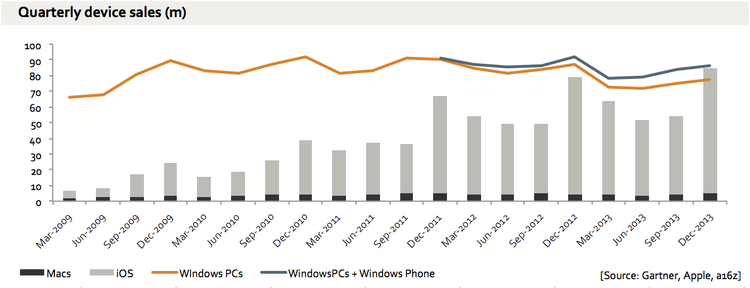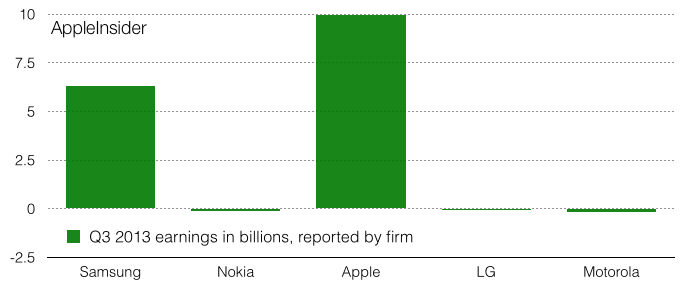Apple, Inc. sold more computers than all of Microsoft's Windows PC partners in December quarter
Seven years after entering the mobile computing market with iPhone, the Cupertino-based company has now reached a peak of building and selling more computers than all of Microsoft's Windows licensees put together.
As noted by leading market analyst Benedict Evans, Apple's combined production of Mac, iPhone, iPod touch and iPad devices peaked in the December quarter at a level slightly higher than all Windows PCs put together, or essentially equal with all PCs combined with all Windows Phone shipments.
Such sales volumes were unthinkable for Apple just a few years ago. While the company's Mac desktops and notebooks were growing significantly in the mid 2000s, they still remained in the realm of a million or two systems each year, in contrast to annual PC shipments well above 200 million.
Mac gets big by going small
In 2007, Apple began selling a new kind of Macintosh: a handheld device running the same core OS (it was even called "iPhone OS X" in the beginning) and using a mobile-optimized version of the Mac's NeXT-derived Cocoa app development frameworks. By the end of the year, Apple added iPod touch, it's first iPod based on Mac technology like the iPhone rather than a simple, imbedded OS.
Without phone features, iPod touch acted more like a general purpose computing system, attracting many users who were already committed to using their company's Blackberry or a simpler phone tied to a provider such as Verizon or NTT DoCoMo, and simply couldn't switch to an iPhone. That boosted the volumes of games and other app sales in the App Store, supporting iPhone growth and paving the way for a larger new table form factor.
In 2010, developers' enthusiasm surrounding Apple's rapidly expanding iOS platform was extended to iPad, which worked like a larger format iPod touch to broaden the reach and utility of Apple's platform that proved to be effortlessly easy to use, manage and deploy. iPad now enjoys a deployment rate above 91 percent in the enterprise, and is also
The most notable aspect of Apple's growth is that its Macs continue to maintain an premium Average Selling Price of $1300 and its iPhones remain above $650, in a PC market where Microsoft's PC makers struggle to find customers with PCs priced at an average of $311, and where Windows Phones sell at an ASP of just $301.
Apple flogs Android in profitability and premium sales
Apple's ability to surpass Microsoft's Windows sales volume via mobile growth can also be compared to Android. Like Windows, Google's Android platform (and the many variants of the software used by companies from Amazon to Chinese vendors unaffiliated with Google) is broadly used as an alternative to companies creating their own custom development platforms.
An an ingredient, Android lacks the platform strength of Windows, because Google is unable to exercise much control over its licensees, despite attempts to do so.
Google also earns very little from Android as a platform compared to Microsoft's Windows PC licensing, and essentially nothing compared to Apple's far more lucrative, hardware-driven profits from iOS. Samsung said it planned to ship 100 million higher-end Galaxy S and Note models within 2013; Apple sold 153.4 million iPhones alone in 2013.
Android's phone ASP has now dropped to $276 as the majority of "smartphones" using the system apply it in a feature phone role on extremely low end devices with no upgrade potential. Last year, Samsung said it planned to ship 100 million higher-end Galaxy S and Note models within 2013. Apple sold 153.4 million iPhones alone in 2013, without counting iPod touch, iPad mini or full size iPads.
Apple obviously earned more than Samsung in selling high end phones throughout 2013, but also earned far more (an order of magnitude more) on sales of Macs and iPads, a general computing market where Samsung fails to earn much money at all.
Add in every other Android maker's higher end phones and profit-to-volumes ratio falls even faster, as most Android licensees, including Google's own Motorola subsidiary, have been consistently losing money. Google's Motorola subsidiary reported losing $1.245 billion in 2013 alone, despite tech media predictions about how Moto X and its siblings would undercut Apple's iPhone and take over via volume sales to third world countries.
Particularly hysterical in retrospect is the August 2013 article by Steven Levy of Wired, which just months ago faithfully reiterated Google's talking points explaining how the phone would launch a new epoch of smartphones justifying the $12.5 billion price tag Google had paid for Motorola. Instead the device proved to be a dismal failure. Google is now spinning Motorola as "successful" divestiture.
Sales growth of smartphones and tablets is widely expected to slow in 2014, but Apple's high volume position in selling the most profitable smartphones, tablets, notebooks and desktop computers at ASPs that are two to four times as high as competing platforms means Apple has a lot more room to maneuver than its more poorly capitalized competitors who maintain far less user loyalty and satisfaction, and who lack the support of Apple's strong iTunes and App Store ecosystem.
 Daniel Eran Dilger
Daniel Eran Dilger















 Amber Neely
Amber Neely
 Thomas Sibilly
Thomas Sibilly
 AppleInsider Staff
AppleInsider Staff
 William Gallagher
William Gallagher
 Malcolm Owen
Malcolm Owen
 Christine McKee
Christine McKee










162 Comments
Wait a minute. I thought Apple had a disappointing quarter. A terrible quarter. Oh, I forgot. That was what all the moronic hedge fund managers and stock analysts said. The idiots who make up their own numbers instead of focusing on what Apple actually achieved. Good for Apple. We shouldn't kill all the lawyers. We should kill all the analysts.
Not sure I'm comfortable with mobile phones being placed up against traditional PC's in this data. Adding iPads & Mac's together no problem but adding in iPhones...... You might as well start adding in my calculator wrist watch from the 80's, it's able to compute after all.
Not sure I'm comfortable with mobile phones being placed up against traditional PC's in this data. Adding iPads & Mac's together no problem but adding in iPhones...... You might as well start adding in my calculator wrist watch from the 80's, it's able to compute after all.
Phones are effectively PC's, and will more and more take over their role.
Anyhow, there's a big fat 'I told you so' to whoever I was arguing with on here when I predicted this day would come many years ago :)
[quote name="saarek" url="/t/162047/apple-inc-sold-more-computers-than-all-of-microsofts-windows-pc-partners-in-december-quarter#post_2472039"]Not sure I'm comfortable with mobile phones being placed up against traditional PC's in this data. Adding iPads & Mac's together no problem but adding in iPhones...... You might as well start adding in my calculator wrist watch from the 80's, it's able to compute after all.[/quote]Does your calculator from the 80s run Unix?
Totally true… So much foresight on behalf of Apple! I remember back in December 2008 when the analysts at the shareholders meeting were asking Steve Jobs why he doesn't do a netbook and he had the famous reply that Apple doesn't know how to do a laptop under $500 that's not crap, he also said something else… He said iPod touch was Apples alternative to netbooks at that date, &nobody saw it coming but iPod touch was really the computer in 2008 and precursor to the iPad behemoth